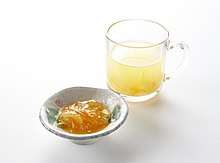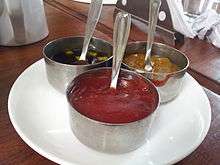Yuja tea
Yuja-cha (유자차; 柚子茶) or yuja tea is a traditional Korean tea made by mixing hot water with yuja-cheong (yuja marmalade).[1] Yuja tea is popular throughout Korea, especially in the winter.[2] This tea is created by curing yuja into a sweet, thick, pulpy syrup.[3] It does not contain caffeine.[4] It is often sold in markets (in large jars) and used in households as a common cold remedy.
 Yuja-cha (yuja tea) and yuja-cheong (yuja marmalade) | |
| Type | Herbal tea |
|---|---|
| Country of origin | Korea |
| Ingredients | Yuja-cheong |
| Korean name | |
| Hangul | 유자차 |
|---|---|
| Hanja | 柚子茶 |
| Revised Romanization | yuja-cha |
| McCune–Reischauer | yuja-ch'a |
| IPA | [ju.dʑa.tɕʰa] |
Yuja tea is made from the fruit Yuja, citron, or Yuzu (in Japanese). These fruits do not contain much juices, unlike other citrus fruits. They are able to cook in high temperatures without losing its tart flavor.[5] Yuja fruits have a strong fragrance. Its scent comes from the zest, juices, and essential oils.[6] Yuja tea is both bitter and sweet. In addition, Yuja tea is a preservative, so it can be left out on a shelf or counter.[7]
History
The history of the yuja tea took place in China, where it is known as youzi tea (柚子茶). A man was carrying a shipment of yuja trees from China to Korea until a storm came and hit his boat. The yuja trees were destroyed, but some of the seeds went into the man's coat.[8] As the man continued on Korea's soil, the seeds fell on the ground and grew into yuja trees.[9] Koreans saw the benefits the leaves had and used the yuja leaves for the common cold by crushing it.[10] Because of its bitter taste, they began to preserve the leaves in sugar and honey, which later developed into the yuja tea.[11] King Sejong, who was responsible for the creation of the Korean Hangul script, was its greatest advocate.[12]
Names
Occasionally, the term yuja-cha can also be used to refer to the jarred yuja marmalade used to make the tea.[13][14] The drink's name is sometimes translated into "citron tea" or "honey citron tea" in English,[15][16] but yuja and citron are different citrus fruits.
Benefits
Yuja tea is well known for its health benefits, albeit medically unproven. It is said to have more vitamin C (2.3 times more) than raw lemon juice.[17] The vitamin C in yuja tea allegedly helps the immune system to fight against infections and other diseases/illnesses.[18]
Other various alleged health benefits include:
- Common cold
- Sore throats
- Fever
- Blood Circulation
- Seasickness
- Enhance skin complexion
- Strengthen bones
- Digestive problems, such as constipation and diarrhea
- Lowering blood pressure
- Improve discoloration[19]
Preparation
Yuja tea can be made at home from scratch. The ingredients needed are citrus fruit (can be lemon or grapefruit) or yuja, honey, and sugar. The first step is thoroughly clean the fruits. Next, cut the yuja into thin slices and remove the seeds. Put the yuja slices into a bowl, and mix in the honey and sugar. Lastly, put the mixture in a container and store it in a cool, dark until the syrup is created (about six months).[20] When ready, stir in 1-2 tablespoon of Yuja tea into hot water.[21] The syrup of the yuja tea is also used in cocktails, spread for toast, or ice cream. [22]
Gallery
 Bottled yuja-cha
Bottled yuja-cha Korean yuja tea
Korean yuja tea
See also
- Traditional Korean tea
References
- "yuja-cha" 유자차. Standard Korean Language Dictionary (in Korean). National Institute of Korean Language. Retrieved 20 June 2017.
- "Korean Citron tea – A new taste for tea drinkers with Caffeine". Yazu+ Organic Korean Citron Tea.
- "Korean Yuja-Cha". SAVEUR.
- "Korean Citron tea – A new taste for tea drinkers with Caffeine". Yazu+ Organic Korean Citron Tea.
- "What is Yuzu Citrus – Japanese Lemon? | White On Rice Couple". White On Rice Couple. 29 January 2017.
- "Yuja Is So Tart Right Now". SKINFOOD since 1957.
- "10 Strange and Wonderful Korean Teas". pastemagazine.com. 22 October 2015.
- Team, General Ming's Editorial (26 January 2013). "History of Korean Citron Tea". General Mings - the delicious dynasty.
- "History of Korean Citron Tea". General Mings - the delicious dynasty. 26 January 2013.
- "The Fascinating History of Korean Citron Tea". Yazu+ Organic Korean Citron Tea. 12 March 2013.
- "The Fascinating History of Korean Citron Tea". Yazu+ Organic Korean Citron Tea. 12 March 2013.
- "Traditional Drinks | Official Korea Tourism Organization". english.visitkorea.or.kr.
- Liu, Jamie (24 October 2014). "Trend Watch: Asian Spirits and Cocktail Ingredients". Eater DC. Vox Media. Retrieved 5 January 2017.
- Joo, Judy (17 May 2016). "Citron Tea Posset". The Daily Meal. Retrieved 5 January 2017.
- Shnidman, Ronen (19 October 2011). "Fruit of the season". The Jerusalem Post. Retrieved 5 January 2017.
- Helman, Scott (28 April 2015). "Leo's Village: One severely burned boy, his devoted caregiver, and a community's embrace". The Boston Globe. Retrieved 5 January 2017.
- "Howard Community College Library Off-Campus Access". advance-lexis-com.libproxy.howardcc.edu. Eileen Cho.
- "Amazing Korean Yujacha a Tasty Herbal Remedy – TastyKFood". tastykfood.com.
- "YuJa Cha – The Healthy Benefits of Korean Citron Tea". General Mings - the delicious dynasty. 29 September 2014.
- "Yuja Marmalade". SOOK.
- "Korean Citron Yuzu Tea from Scratch | Oh, How Civilized". Oh, How Civilized. 21 January 2018.
- "10 Strange and Wonderful Korean Teas". pastemagazine.com. 22 October 2015.
External links
| Wikimedia Commons has media related to Yuja tea. |
- Yujacha recipe from Korea National Tourism Organization, published by Asia Society
